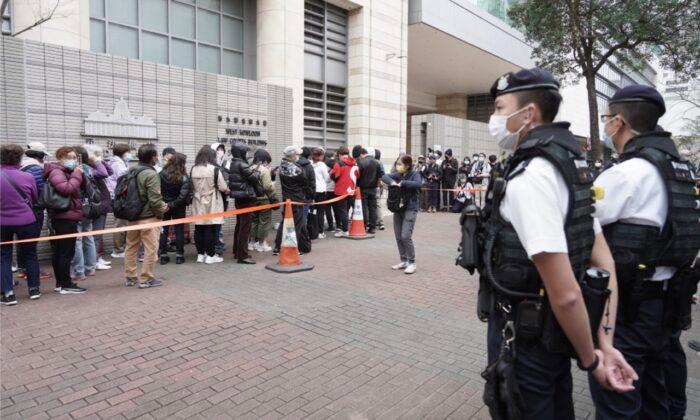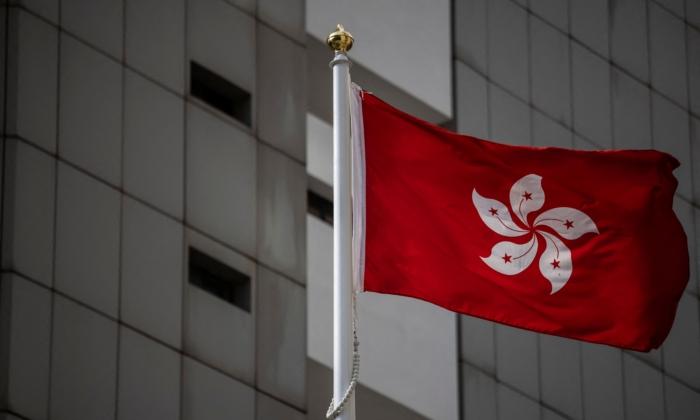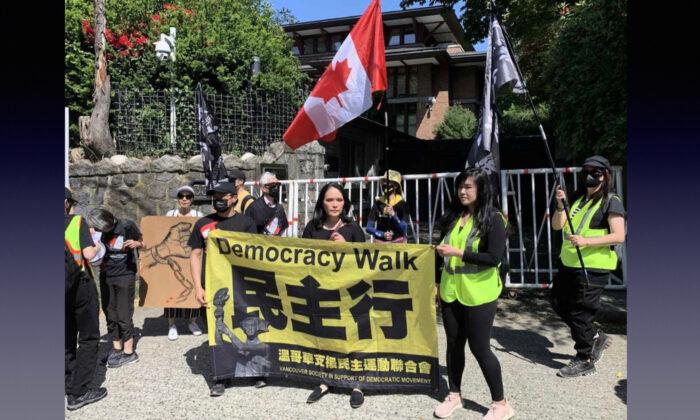A group of 47 pro-democracy activists in Hong Kong (HK 47) charged with “conspiracy to subvert state power” are back in court after almost two years. Among them, 16 defendants who have pleaded not guilty began their trial in the West Kowloon Magistrates’ Court (acting ad interim for the High Court) on Feb. 6. The trial is estimated to last 90 days.
The HK 47 primary election trial is the first case of “conspiracy to subvert state power” under the Hong Kong National Security Law. If convicted, there will be three levels of punishment. The “ringleader(s)” could face life imprisonment.
Over 100 Show Up for Hearing
At about 5:30 a.m. on Feb. 6, when the court was still closed, there was already a long queue outside the West Kowloon Court. Many people came fully prepared, bringing chairs and sleeping bags to wait for the hearing. At the same time, a large contingent of police officers was on standby at the scene.In addition to social activists, there were representatives from consulates in the queue, including the U.K., the U.S., Australia, France, Italy, and the EU. Frequent social activist Alexandra Wong Fung-yiu waved the British flag at the prison van entrance. And she was surrounded by some police officers.
Protesters Taken Away
Three members of the League of Social Democrats protested outside the court on the morning of the trial, expressing their innocence in the primary election and demanding the release of political prisoners.They asked to protest at the main entrance, but police refused and surrounded them in a flower trough opposite the court.
One of them, Dickson Chau, pulled off his mask while speaking for a few seconds to the reporters, and the police immediately accused him of “not wearing a mask in public” and took him into a police van. With the reporters rushing forward to catch the view, there was a brief period of chaos at the spot.
Chan Po-ying, the League’s chairperson, told the Epoch Times that she feels despair as now Hong Kong is now like a “democracy within a birdcage,” all demonstrations big and small require clemency from the government, and almost every petition and demonstration by the League has been suppressed in different ways. But she still hopes to be able to continue the petition.

Primary Elections
After the outbreak of the anti-extradition movement in Hong Kong, the anti-communist democrats won a landslide victory in the 2019 District Council elections. Pro-democracy supporters hoped that the democrats could continue this momentum and win more than half (over 35) of the seats in the Legislative Council election scheduled for 2020. The success of that would mean they can exert more pressure on the government and upend the situation where pro-communist factions control the legislature.The democrats held a primary election on July 11-12, 2020, hoping they could decide who stands for what in the relevant Legislative Council seats. The result of the primary election was not legally binding, but it was the decision of the Hong Kong voters. Despite the fact this election was not arranged by the government, there were more than 610,000 voters.
However, the 47 candidates for this primary election were later charged with “conspiracy to subvert state power” by the Hong Kong government.
‘Violating the Principle of Presumption of Innocence’
On Feb. 4, Lew Mon-hung, a former member of the Chinese People’s Political Consultative Conference, criticized the case as not complying with the principle of the presumption of innocence under the Hong Kong Basic Law, which led to prison without trial and damaged Hong Kong’s status as an international financial center.In an interview with the Epoch Times, he said that it was shocking that the 47 people in the primary election case were detained for more than 700 days without trial or sentencing, regardless of whether they pleaded guilty or not.
“The Basic Law states clearly that the common law is retained in Hong Kong. What does the spirit of the common law include? The first thing is respect for the organic unity of objective and procedural justice, respect for judicial independence, adherence to the principle of presumption of innocence, and the jury system. It is within such a legal system that a mechanism of judicial independence is included.” Lew said,
The Basic Law was promulgated by the rubber stamp Congress of the China Communist Party (CCP) on April 4, 1990, and came into effect after the CCP took over Hong Kong on July 1, 1997. Article eight of the Basic Law stipulates that common law is retained.
Lew also questioned why, with no trial and without sentencing, a guilty plea, or not, those people were imprisoned for more than 700 days. “This is a blatant violation of the common law basics of the principle of presumption of innocence.”
He emphasized that Hong Kong was known as one of the four Asian tigers in the last century and later became an international financial, trade, and shipping center because freedom and the rule of law were here as the cornerstones of Hong Kong. And with them, Hong Kong people have the “freedom of not fearing,” thus gaining international recognition.
Lew said bluntly that the cornerstone of Hong Kong’s freedom and the rule of law has been destroyed. He said, “Hong Kong’s talents and funds have flowed out and flowed to competitors as in the tale of two cities.”
Lew called on the Chinese and Hong Kong authorities to return to the Basic Law. Only under “one country, two systems” can Hong Kong’s status as an international financial center be revived.




